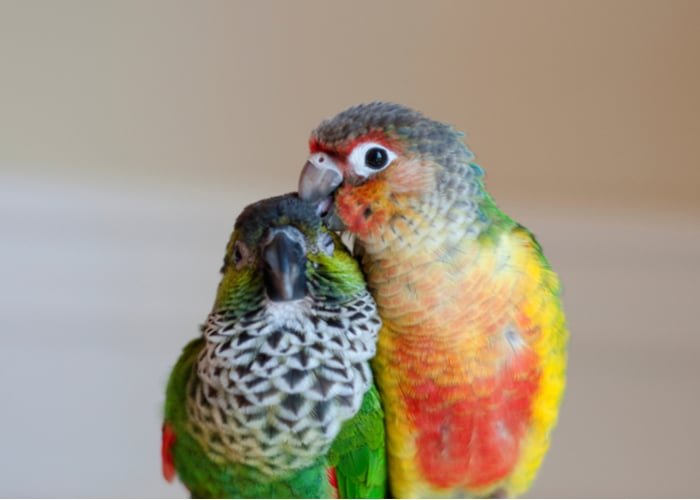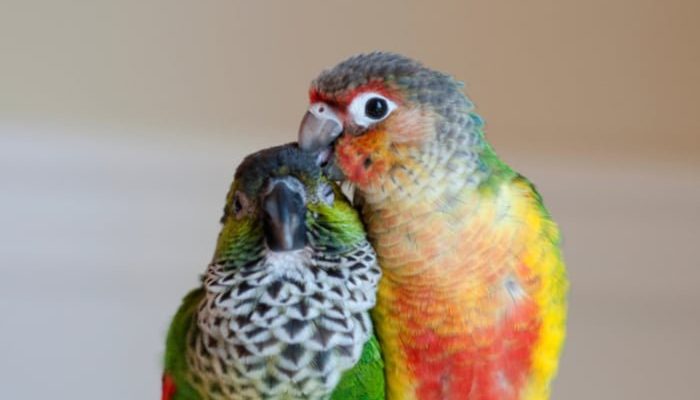
Imagine this: You’re at a party, and everyone’s chatting, laughing, and having fun, but you’re stuck in a corner by yourself. Not the best scenario, right? That’s kind of what it can be like for conures if they’re left alone all day, every day. Let me explain what makes these feathered friends tick, and how you can ensure they live their best lives—whether solo or with a buddy.
The Social Nature of Conures
Conures are undeniably social creatures. In the wild, they live in large flocks, where they bond, play, and communicate with each other constantly. Here’s the thing: when you bring a conure into your home, you’re stepping into the role of their flock. That means you need to be ready to interact with them regularly. If you’re someone who can spend plenty of quality time with your bird—talking, playing, and giving affection—your conure might thrive as your one-and-only companion.
However, if you’re busy throughout the day, it’s important to consider your conure’s emotional needs. A lonely conure can become bored, anxious, or even develop behavioral issues. To avoid this, many owners opt to provide a second bird as a companion. Having another conure can help ensure that both birds engage in natural social behaviors. They can play together, preen each other, and even mimic sounds to each other, making your home a lively place full of chirps and chattering.
Can Conures Live Alone? The Risks and Rewards
So, can a conure truly live alone? Yes, but it’s not without its challenges. If you’re considering having a single conure, make sure you can dedicate ample time and attention to your feathery friend. Daily interaction is key, as a lack of socialization can lead to negative feelings for your bird. It’s like having a plant without sunlight; eventually, it won’t thrive.
On the flip side, having just one conure can lead to a strong bond between you and your bird. You’ll likely become their favorite person—imagine the joy of building a relationship where your conure recognizes your voice, comes when called, and interacts with you on a deeper level. Just keep in mind that you should provide plenty of toys, challenges, and activities to keep their minds active and engaged.
Providing Enrichment for Solo Conures
If you choose to keep a conure by itself, it’s essential to enrich its environment. Here are some ideas to keep your solitary friend happy:
- Toys: Rotate different toys regularly to keep things fresh. Conures love toys they can chew, climb on, and manipulate.
- Interactive Play: Set aside time each day for play sessions. Hanging out together, playing games, or even teaching them tricks can strengthen your bond.
- Out-of-Cage Time: Allow your conure to explore safely outside its cage. This can be a fascinating adventure for them and help alleviate loneliness.
With these activities, you can make sure your solo conure stays stimulated and happy. It’s all about finding creative ways to meet their need for social interaction.
The Benefits of Having a Companion
If you’re considering getting a second conure, there are plenty of benefits to think about! Firstly, two conures can keep each other entertained. They’ll often engage in playful antics that you might find adorable. This companionship can ease the pressure on you as the sole source of entertainment and emotional support.
Another advantage is that conures can learn from one another. If you have an older or more experienced conure, they can teach a younger bird how to do things like mimic sounds or interact playfully. Plus, watching them bond can be heartwarming; it’s almost like having your own little reality show at home.
Of course, introducing a new bird requires some careful planning. It’s important to allow them to adjust gradually, starting with supervised interactions before letting them socialize freely. This helps mitigate any potential territorial behaviors and promotes a smoother adjustment period.
Factors to Consider
Before deciding whether to keep a single conure or get a companion, consider these factors:
- Time Commitment: Can you devote enough time to your bird each day? If your schedule is packed, two birds might help reduce loneliness.
- Space: Do you have enough room for two cages in case they need separate spaces? Conures can be territorial, so having extra space can be a benefit.
- Cost: Owning two birds means double the expenses for food, toys, and veterinary care. Ensure your budget can handle this.
These considerations are vital to ensuring that both you and your conures can live harmoniously.
How to Introduce a New Conure
If you’ve decided to add another conure to your home, the introduction process is crucial for a successful pairing. Here’s a simple approach to make it smoother:
1. Separate Spaces: Start by placing the new conure in a separate cage in a different room. This allows them to acclimate to their new home without direct contact.
2. Gradual Introductions: After a few days, you can start letting them see each other from a safe distance. This helps them get used to each other without feeling threatened.
3. Supervised Socialization: Once they seem comfortable, let them interact under supervision. Monitor their body language closely for any signs of aggression or fear.
4. Common Space: After they’ve shown positive behaviors during interaction, you can allow them to share a common space. Always provide plenty of perches and toys to reduce competition.
Patience is key. It might take some time for your new feathered friends to develop a bond, but in time, they could become inseparable!
Final Thoughts
Whether you choose to keep a single conure or invite a second into your home, remember that these birds need interaction and stimulation to thrive. Conures have unique personalities that can flourish with love, care, and attention. If you go solo, make sure you dedicate time to bonding. If you choose to get a companion, you’ll provide your bird with a built-in friend for life. Ultimately, the decision should center around what’s best for you and your feathered companion’s happiness and well-being. With the right care and love, your conure can live a fulfilling life—whether alone or with a buddy.

